Jeep Compass vs SsangYong Rexton - Differences and prices compared
Costs and Efficiency:
Price and efficiency are key factors when choosing a car – and this is often where the real differences emerge.
Jeep Compass has a noticeable advantage in terms of price – it starts at 34200 £, while the SsangYong Rexton costs 41100 £. That’s a price difference of around 6934 £.
Fuel consumption also shows a difference: Jeep Compass manages with 5.80 L and is therefore clearly more efficient than the SsangYong Rexton with 8.20 L. The difference is about 2.40 L per 100 km.
Engine and Performance:
Power, torque and acceleration are the classic benchmarks for car enthusiasts – and here, some clear differences start to show.
When it comes to engine power, the Jeep Compass has a barely noticeable edge – offering 213 HP compared to 202 HP. That’s roughly 11 HP more horsepower.
In acceleration from 0 to 100 km/h, the Jeep Compass is noticeable quicker – completing the sprint in 8.50 s, while the SsangYong Rexton takes 10.60 s. That’s about 2.10 s faster.
In terms of top speed, the Jeep Compass performs barely noticeable better – reaching 188 km/h, while the SsangYong Rexton tops out at 184 km/h. The difference is around 4 km/h.
There’s also a difference in torque: SsangYong Rexton pulls evident stronger with 441 Nm compared to 345 Nm. That’s about 96 Nm difference.
Space and Everyday Use:
Whether family car or daily driver – which one offers more room, flexibility and comfort?
Seats: SsangYong Rexton offers clearly perceptible more seating capacity – 7 vs 5.
In curb weight, Jeep Compass is evident lighter – 1667 kg compared to 2145 kg. The difference is around 478 kg.
In terms of boot space, the SsangYong Rexton offers noticeable more room – 784 L compared to 550 L. That’s a difference of about 234 L.
In maximum load capacity, the SsangYong Rexton performs evident better – up to 1977 L, which is about 416 L more than the Jeep Compass.
Who wins the race?
The Jeep Compass proves to be outperforms in nearly all aspects and therefore becomes our DriveDuel Champion!
Jeep Compass is the better all-rounder in this comparison.
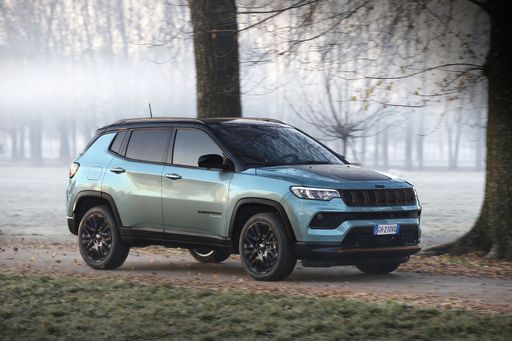 @ Jeep / Stellantis Media
@ Jeep / Stellantis Media
Jeep Compass
Costs and Consumption
View detailed analysis
Engine and Performance
View detailed analysis
Dimensions and Body
View detailed analysis
Jeep Compass
The Jeep Compass packs classic Jeep styling with a surprisingly composed demeanor, equally at home turning heads in the city or tackling a weekend dirt track. Inside it's a pragmatic, user-friendly compact SUV that prioritizes comfort and versatility — a smart pick if you want a dose of adventure without giving up everyday sense.
details @ Jeep / Stellantis Media
@ Jeep / Stellantis Media
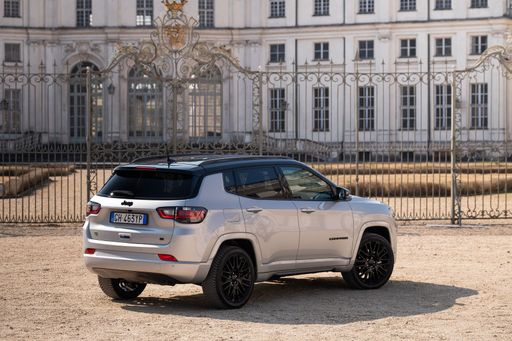 @ Jeep / Stellantis Media
@ Jeep / Stellantis Media
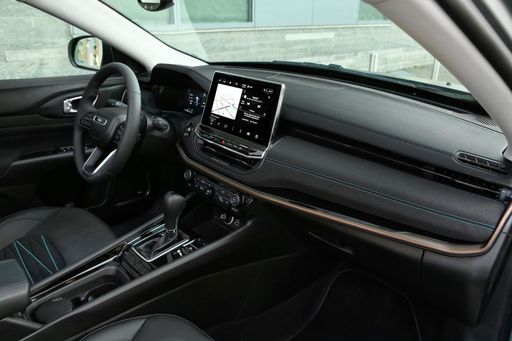 @ Jeep / Stellantis Media
@ Jeep / Stellantis Media
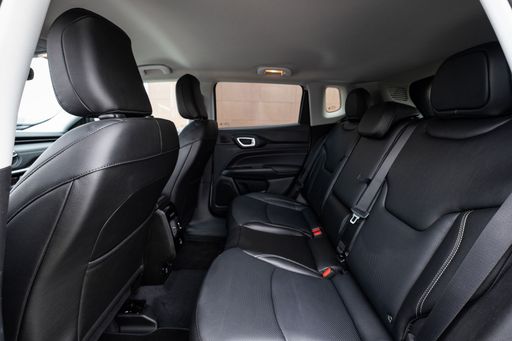 @ Jeep / Stellantis Media
@ Jeep / Stellantis Media
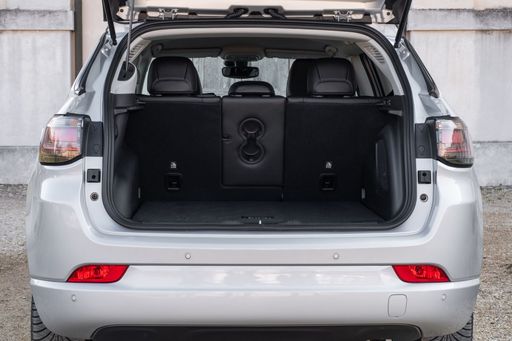 @ Jeep / Stellantis Media
@ Jeep / Stellantis Media
SsangYong Rexton
The SsangYong Rexton is a no-nonsense full-size SUV that pairs rugged, go-anywhere bones with a surprisingly plush cabin, making it an appealing choice for buyers who want capability without premium-brand prices. It won’t turn heads like a luxury badge, but its generous space, sensible features and honest practicality make it a smart, down-to-earth family hauler — a savvy pick if you value substance over status.
details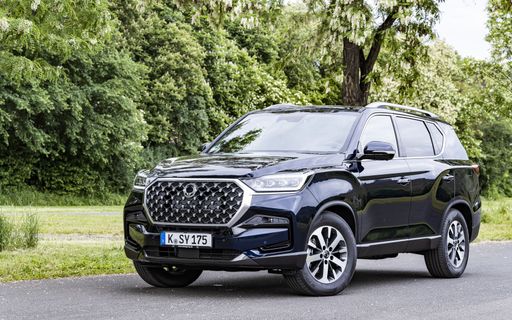 @ SsangYong Motor / KG Mobility
@ SsangYong Motor / KG Mobility
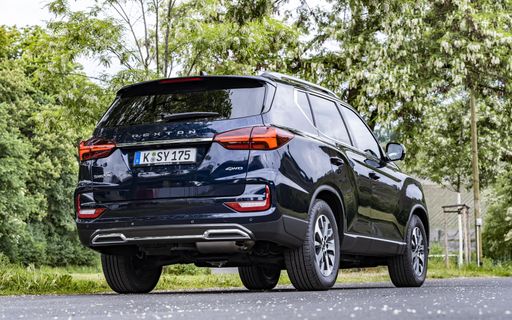 @ SsangYong Motor / KG Mobility
@ SsangYong Motor / KG Mobility
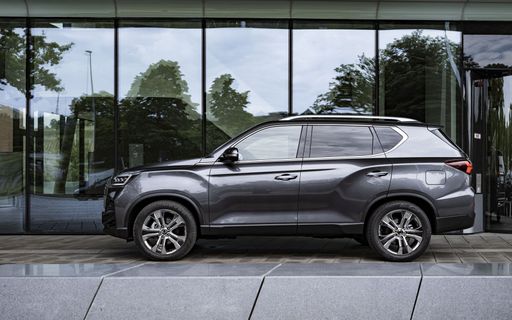 @ SsangYong Motor / KG Mobility
@ SsangYong Motor / KG Mobility
 @ SsangYong Motor / KG Mobility
@ SsangYong Motor / KG Mobility
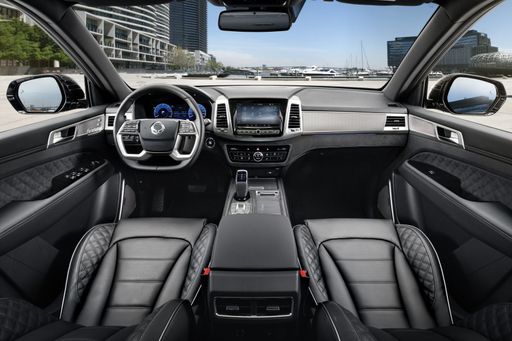 @ SsangYong Motor / KG Mobility
@ SsangYong Motor / KG Mobility
 @ Jeep / Stellantis Media
@ Jeep / Stellantis Media
|
 @ SsangYong Motor / KG Mobility
@ SsangYong Motor / KG Mobility
|
|
|
|
Costs and Consumption |
|
|---|---|
|
Price
34200 - 43200 £
|
Price
41100 - 51300 £
|
|
Consumption L/100km
5.8 - 5.9 L
|
Consumption L/100km
8.20 L
|
|
Consumption kWh/100km
17.50 kWh
|
Consumption kWh/100km
-
|
|
Electric Range
500 km
|
Electric Range
-
|
|
Battery Capacity
74 kWh
|
Battery Capacity
-
|
|
co2
0 - 133 g/km
|
co2
214 - 216 g/km
|
|
Fuel tank capacity
55 L
|
Fuel tank capacity
70 L
|
Dimensions and Body |
|
|---|---|
|
Body Type
SUV
|
Body Type
Off-Roader
|
|
Seats
5
|
Seats
5 - 7
|
|
Doors
5
|
Doors
5
|
|
Curb weight
1667 - 2198 kg
|
Curb weight
2145 - 2180 kg
|
|
Trunk capacity
550 L
|
Trunk capacity
236 - 784 L
|
|
Length
4552 mm
|
Length
4850 mm
|
|
Width
1928 mm
|
Width
1960 mm
|
|
Height
1675 mm
|
Height
1825 mm
|
|
Max trunk capacity
1561 L
|
Max trunk capacity
1806 - 1977 L
|
|
Payload
-
|
Payload
655 - 770 kg
|
Engine and Performance |
|
|---|---|
|
Engine Type
Petrol MHEV, Electric
|
Engine Type
Diesel
|
|
Transmission
Automatic
|
Transmission
Automatic
|
|
Transmission Detail
Dual-Clutch Automatic, Reduction Gearbox
|
Transmission Detail
Automatic Gearbox
|
|
Drive Type
Front-Wheel Drive
|
Drive Type
All-Wheel Drive
|
|
Power HP
145 - 213 HP
|
Power HP
202 HP
|
|
Acceleration 0-100km/h
8.5 - 10.3 s
|
Acceleration 0-100km/h
10.60 s
|
|
Max Speed
180 - 188 km/h
|
Max Speed
184 km/h
|
|
Torque
230 - 345 Nm
|
Torque
441 Nm
|
|
Number of Cylinders
3 - 4
|
Number of Cylinders
4
|
|
Power kW
107 - 157 kW
|
Power kW
148 kW
|
|
Engine capacity
1199 cm3
|
Engine capacity
2157 cm3
|
General |
|
|---|---|
|
Model Year
2025
|
Model Year
2021 - 2023
|
|
CO2 Efficiency Class
D, A
|
CO2 Efficiency Class
G
|
|
Brand
Jeep
|
Brand
SsangYong
|
What drivetrain options does the Jeep Compass have?
The Jeep Compass is available as Front-Wheel Drive.
The prices and data displayed are estimates based on German list prices and may vary by country. This information is not legally binding.
